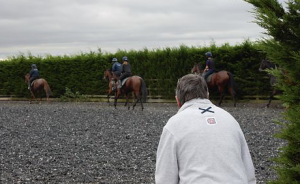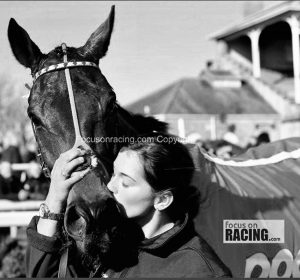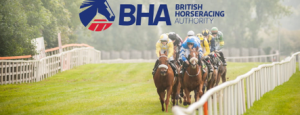Will Covid-19 lockdown threaten the welfare of race horses?
We are living in difficult and uncertain times with the whole of the UK now in lockdown. Horse racing, like many other sports, was suspended from 17th March until the end of April, to help limit the spread of the virus.
However, racing is still going ahead in the USA, Hong Kong and Australia.
The jump season was in full swing with the Cheltenham festival just finishing and the flat season due to begin earlier this week. Thousands of trainers, jockeys and stable staff will have put endless time into getting these equine athletes ready for the racing season.
Trainers and stable staff may not be seen as essential workers in the outside world, but they are absolutely crucial to horse welfare. The horses have to be cared for 24/7, fed, mucked out, exercised, veterinary checked, shod, and a range of other services.

George McGrath, Chief Executive of the National Association for Racing Staff states that it is completely essential that stable staff still go to work and maintain the health of the industry.
Flat trainer Tony Carroll, who boasts a 100+ racehorse fleet, explains how he is coping with the lockdown.
“Everything is shut down here, so only stable staff are allowed into the yard and two suppliers can come in or leave stuff at the gate,” said Tony.
“We are coping quite well, considering. We are riding out as normal, it’s almost business as usual. All the horses still need to be exercised every day, we’ve just had to change the fitness system, by not working the horses too hard as we have no racing. We are being a bit more careful and on hold for the moment.
“We are all keeping to the government’s social distancing rules while riding out, it’s a good regime going on behind the scenes while no racing is going on. Touch wood we haven’t had anyone poorly or anything, under the circumstances it’s working well, and the weather has helped, it’s been glorious,” said Tony.
“I just hope everybody stays safe, it’s really quite scary watching the news,” he added.
I visited Tony Carroll before the COVID-19 pandemic to explore racehorse welfare at his yard in Cropthorne, The Cotswolds.
Various animal abuse groups such as PETA and Animal Aid target horse racing, labelling it an “intrinsically cruel and exploitative industry”. Social media evidence and my research reveals that hundreds of stable staff and members of the industry all over the UK are risking their lives, against the virus every day, to look after these majestic athletes.

Shannon Parker with Bernie
One of those risking their life in the pandemic is Shannon Parker, who works as a stable lass for Fergal O’Brian Racing in Gloucestershire.
“It is vital to carry on working with the horses during lockdown because they can’t muck themselves out or feed themselves and they need to be ridden everyday to keep their fitness levels up, so they are good to race as soon as the season starts again,” said Shannon.
“Race horses need to be treated as professional athletes. They get fresh bedding twice a day and fed three times a day to a diet that suits their needs. They get brushed daily and get lots of treats as well,” she added.
“I look after five horses and you do get very attached to them, especially when you look after them from a young age and go along on their journey through life.
“We don’t work with race horses for the money because there are plenty of easier jobs which pay the same, we work with horses because we love them,” she said.

The British Horseracing Authority Chair, Annamarie Phelps, states the BHA is proud of its values of integrity and accountability they take for horse welfare.
“We take responsibility for ensuring that every horse bred to race leads a life well-lived. It’s an ethical relationship and a moral duty, based on respect, love and the highest standards of care,” said Annamarie.
“We make champions of horses. We celebrate them as competitors and companions and want them all to enjoy a life worth living. We do what’s right for the horse and what’s right for our people. Nothing’s more important than the health and safety of all our athletes – human and equine.”
The BHA is aware of the significant bills that come with caring for horses and that these demands need to be met even without the income that racing would normally bring. In order to meet these challenges, the sport is currently pulling together an industry-wide action plan to ensure that horses are not at risk of falling into neglect.
The plan includes provision for the cutting of costs to the racing industry by up to £1 million a month whilst the COVID-19 crisis persists. In addition, the BHA announced that entry fees have been refunded and fees to participants dropped where possible.
Robin Mounsey, Head of Media at the BHA, highlighted the safety nets that are put in place by the BHA to ensure the racing industry are equipped to care for the horses during lockdown.
“The vast majority of racing’s workforce, over 80%, will remain unfurloughed and able to travel to work to carry out their essential role providing thoroughbreds with the first class care and attention that they are accustomed to,” said Mr Mounsey.
“The sport also has safety nets in place in case there has been a significant exodus of horses being withdrawn from training, but this hasn’t materialised so far and the numbers of horses who have remained under the care of licensed trainers has remained relatively stable,” he added.

The BHA and Racing Welfare also focus on both the mental and physical health of the people who work in racing, as they state that a ‘healthy workforce is critical for the care of horses’.
The Racing Welfare Support line is staffed 24/7 to deal with any issues from financial hardship to mental health concerns, for ALL people involved in racing. They’re there to help and make sure that no one feels isolated at this time, or feeling as though they have no one to turn to.
Racing’s Support Line is open 24/7 on 0800 6300 443 to anyone needing assistance or via live chat online at www.racingwelfare.co.uk.